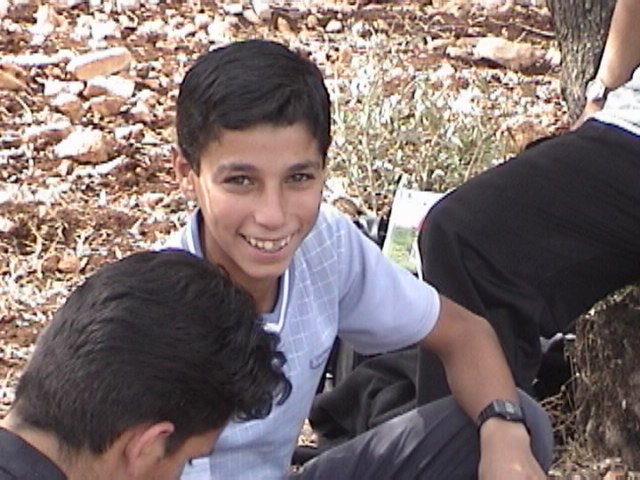November 4, 2002
11th Graders on a picnic.
Enjoying a picnic among the olive trees.
Today was the 11th grade class trip/excursion. Each of the grades gets one day each semester to go mish waar, a half-day of school followed by a picnic. Elizabeth, who teaches English to the 11th graders twice a week, was invited to accompany them as one of the chaperones. The students carted their barbecue fixings to the stony, olive-treed hills and set up camp. It's amazing to think how old these kids are and how much more mature they are than their American counterparts in some ways. Their concerns are not preoccupied by the stereotypical frivolity of high school (what clothes to wear, when to go to the mall, whom to ask to the prom). This seems partly due to differences in society and culture (no prom, no mall) and partly because an atmosphere of violence and impoverishment makes kids (worldwide) grow up fast. Nevertheless, the picnic trip was a nice opportunity for the kids to be kids, playing cards, singing, giggling, telling riddles and jokes. They translated some of these for Elizabeth, who even told one herself. The kids laughed a lot, but Elizabeth isn't sure if it was at the joke or at her Arabic. Either way, a good time was had by all.
On their way home, Elizabeth and the other chaperone stopped for coffee and guava fruit with one student's family. Originally from Nablus, her father works at a bank in Jenin. He and his wife shared stories of Nablus, of their thirteen years in Saudi Arabia (where he worked in a bank), and trips to Ireland (for training in banking software). Both of them (and their parents, and their parent's parents) are from Nablus, making them as "city" as you can get. Elizabeth chatted with them about making the urban-to-rural transition, as she's done from Chicago to here. They clearly miss their families and the amenities and busy life of the big city. Like many people, he used to commute to work daily between Nablus and Jenin. But multiplying checkpoints and accelerating military destruction of roads made that impossible, so he decided to move to Jenin. He went ahead last winter to make the arrangements and then sent a special car to bring his family to be with him. The car arrived to the outskirts of Nablus, where a soldier made the mother and four kids get out of the car and then riddled the car with bullets. Like many kids in this battered land, the ten-year-old brother is still suffering psychologically from the trauma. They moved to Jenin, just in time for the April 2002 incursion. Bad timing. The apartment they were renting was slated for a house-to-house search. When soldiers reached the oldest son's bedroom, they found a shaheed poster, the ubiquitous pictures of those who have been killed, or have killed themselves (and often others) in the cause of Palestine. The young man in this poster was a brother of a friend and had been given to him as a gift - to help his friend's grief over losing his brother, he had put the poster in a place of honor. The soldiers closed the bedroom door and beat him, the family helplessly listening to the thuds in the other room. They left Jenin. Now, they have moved to Zababdeh, and the kids have enrolled in school here. With Jenin closed, he's currently not working. This conflict touches everyone...


